
The Bolsheviks, led by Vladimir Lenin, were a far-left faction of the Marxist Russian Social Democratic Labour Party (RSDLP) which split with the Mensheviks at the Second Party Congress in 1903. The Bolshevik party, formally established in 1912, seized power in Russia in the October Revolution of 1917, and was later renamed the Russian Communist Party, All-Union Communist Party, and Communist Party of the Soviet Union. The party's ideology, based on Leninist and later Marxist–Leninist principles, is known as Bolshevism.

V. Volodarsky was a Marxist revolutionary and Soviet politician. He was assassinated in 1918.
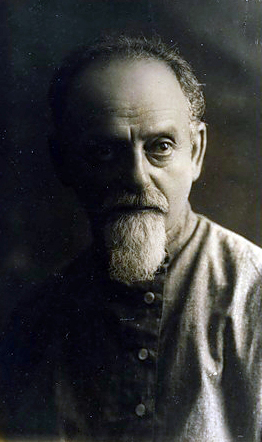
Mikhail Isaakovich Liber, sometimes known as Mark Liber, was a leader of the General Jewish Workers' Union. He also played a role in the Russian Social-Democratic Workers' Party (RSDRP) and was a leading figure among the Mensheviks. Liber was instrumental in the soviets during the February Revolution of 1917 but opposed to October Revolution. He was reportedly shot during the Purges. Liber played a defining role in the development of the Bund and helped shaped the policies of the leaders of the February Revolution.
Yedinstvo or Edinstvo was a faction within the Russian Social Democratic Labor Party (RSDLP) between 1914 and 1917 and then a small independent party in 1917 and 1918. It was led by Georgi Plekhanov.
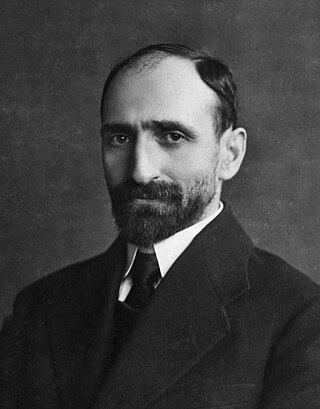
Noe Besarionis dze Ramishvili was a Georgian politician and the president of the first government of the Democratic Republic of Georgia. He was one of the leaders of the Menshevik wing of the Russian Social Democratic Labour Party. He was also known by his party noms de guerre: Pyotr, and Semyonov N.
In the course of the history of the Russian Social Democratic Labour Party (RSDLP between 1898 and 1918), several political factions developed, as well as the major split between the Bolsheviks and the Mensheviks.
The Revolutionary Ukrainian Party was a Ukrainian political party in the Russian Empire founded on 11 February 1900 by the Kharkiv student secret society Hromada.
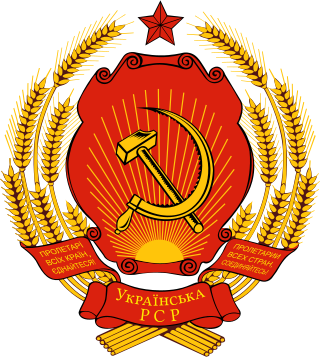
The Communist Party of Ukraine was the founding and ruling political party of the Ukrainian SSR operated as a republican branch of the Communist Party of the Soviet Union (CPSU).

The Ukrainian Social Democratic Labour Party, also commonly known as Esdeky, was a social-democratic political party in the Ukrainian People's Republic. The party was reformed in 1905 at the Second Congress of the Revolutionary Ukrainian Party and was pursuing Marxism through the Social Democratic Party of Germany's Erfurt Program as well as national and cultural autonomy. Party leaders were Volodymyr Vynnychenko, Symon Petliura, Mykola Porsh, Dmytro Antonovych, Lev Yurkevych, Mykhailo Tkachenko, and Mykola Kovalsky.

The 5th (London) Congress of the Russian Social Democratic Labour Party was held in London between May 13 and June 1, 1907. The 5th Congress had the largest attendance of the Congresses of the unified RSDLP. Thirty-five sessions of the Congress were held in the Brotherhood Church in Hackney, during which stormy debates took place.
Vpered was a subfaction within the Russian Social Democratic Labour Party (RSDLP). Although Vpered emerged from the Bolshevik wing of the party, it was critical of Lenin. The group was gathered by Alexander Bogdanov in December 1909 and was active until 1912. Other notable members of the group were Maxim Gorky, Anatoly Lunacharsky, Mikhail Pokrovsky, Virgil Shantser, Grigory Aleksinsky, Stanislav Volski, and Martyn Liadov.

The 3rd Congress of the Russian Social Democratic Labour Party was held during 25 April - 10 May [(12–27 April O.S.)] 1905 in London, UK.
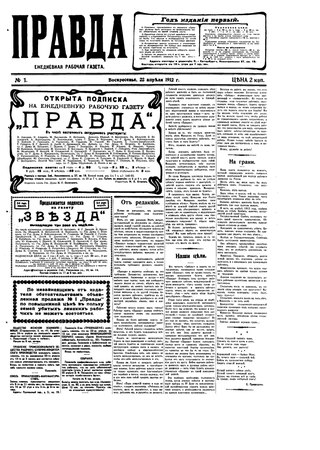
Pravda is a Russian broadsheet newspaper, and was the official newspaper of the Central Committee of the Communist Party of the Soviet Union, when it was one of the most influential papers in the country with a circulation of 11 million. The newspaper began publication on 5 May 1912 in the Russian Empire but was already extant abroad in January 1911. It emerged as the leading government newspaper of the Soviet Union after the October Revolution. The newspaper was an organ of the Central Committee of the CPSU between 1912 and 1991. After the dissolution of the Soviet Union, Pravda was sold by the then Russian president Boris Yeltsin to a Greek business family in 1992, and the paper came under the control of their private company Pravda International.

The Party of Socialist-Revolutionaries, also known as the Socialist Revolutionary Party, was a major political party in the late Russian Empire, during both phases of the Russian Revolution, and in early Soviet Russia.

Yuliy Osipovich Tsederbaum, better known as Julius Martov, was a Russian revolutionary, politician, and the leader of the Mensheviks, a faction of the Russian Social Democratic Labour Party (RSDLP). A close associate of Vladimir Lenin prior to 1903, Martov broke with him following the RSDLP's ideological schism, after which Lenin led the opposing faction, the Bolsheviks. Martov opposed Lenin's plan for a party restricted to professional revolutionaries, and called for a mass party modelled after Western European social democratic parties.

The Mensheviks were a faction of the Marxist Russian Social Democratic Labour Party (RSDLP) which split with Vladimir Lenin's Bolshevik faction at the Second Party Congress in 1903. The Mensheviks were led by Julius Martov and Pavel Axelrod.
The Mezhraiontsy (Russian: межрайонцы, IPA:[mʲɪʐrɐˈjɵnt͡sɨ]), usually translated as the "Interdistrictites," were members of a small independent faction of the Russian Social Democratic Labor Party (RSDLP), which existed between 1913 and 1917. Although the organization's formal name was the Russian Social Democratic Labor Party (Internationalists), the names "Mezhraionka" for the organization and "Mezhraiontsy" for its participants were commonly used to indicate the group's intermediate ideological position between the rival Menshevik and Bolshevik wings of the divided RSDLP.
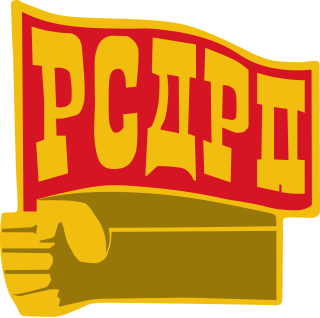
The Russian Social Democratic Labour Party (RSDLP), also known as the Russian Social Democratic Workers' Party (RSDWP) or as the Russian Social Democratic Party (RSDP), was a socialist political party founded in 1898 in Minsk.

The General Jewish Labour Bund in Lithuania, Poland and Russia, generally called The Bund or the Jewish Labour Bund, was a secular Jewish socialist party initially formed in the Russian Empire and active between 1897 and 1920. In 1917, the Bund organizations in Poland seceded from the Russian Bund and created a new Polish General Jewish Labour Bund which continued to operate in Poland in the years between the two world wars. The majority faction of the Russian Bund was dissolved in 1921 and incorporated into the Communist Party. Other remnants of the Bund endured in various countries. A member of the Bund was called a Bundist.
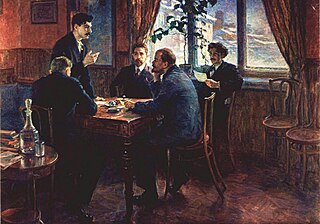
The first conference of the Russian Social Democratic Labour Party (RSDLP) took place in Tampere (Tammerfors), Grand Duchy of Finland, in December 1905. Held between the 1905 London and 1906 Stockholm party congresses at the Tampere Workers' Hall, the conference was an unofficial meeting of the Bolshevik faction of the party. It is particularly remembered for playing host to the first meeting of Vladimir Lenin and Joseph Stalin. The conference resolved to forgo participation in the new State Duma, as did most of the far left parties. They later reversed this decision in 1907.














